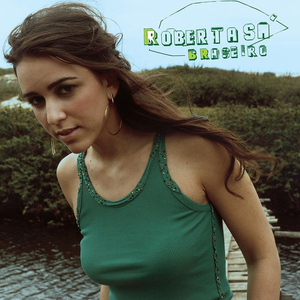Roberta Sá's Official Website
Lavoura
Roberta Sá Lyrics
Jump to: Overall Meaning ↴ Line by Line Meaning ↴
Quatro da manhã
Dor no apogeu
A lua já se escondeu
Vestindo o céu de puro breu
E eu mal vejo a minha mão
A rabiscar
Poesia vã
Pobre verso meu
Que brota quando feneceu
A mesma flor que concebeu
Perdido na alucinação
Do amor
Acreditando na ilusão.
Canto pra esquecer a dor da vida
Sei que o destino do amor
É sempre a despedida
A tristeza é um grão
Saudade é o chão onde eu planto
Do ventre da solidão
É que nasce o meu canto.
Do ventre da solidão é que nasce o meu canto...
The lyrics of Roberta Sá's song, Lavoura, talk about the pain that the singer is going through at four in the morning, as the moon disappears into the black sky. The singer's hand is barely visible as they try to scribble the beginnings of a song, a futile attempt to express their feelings. The words that emerge are meaningless, and they seem to come from a place of desperation and exhaustion as if the writer wants to forget the pain of living. Love, which is supposed to bring joy and fulfillment, has instead brought only illusions and delusions, and the singer is trapped in this cycle of longing and heartbreak. Despite the despair, the singer finds solace in music, which becomes their way of coping with the pain of life.
The chorus of the song highlights the central theme - "Do ventre da solidão é que nasce o meu canto" - my song is born from the belly of loneliness. Here, the writer emphasizes the importance of loneliness in the creative process. Though solitude could be painful, it can also be a fertile ground for artistic expression, providing a space to reflect and create. The song's melody and the hauntingly beautiful vocals of Roberta Sá add to the pathos of the lyrics, creating a mood that is both melancholic and uplifting.
Line by Line Meaning
Quatro da manhã
It's four in the morning
Dor no apogeu
Pain at its peak
A lua já se escondeu
The moon has already hidden
Vestindo o céu de puro breu
Dressing the sky in pure darkness
E eu mal vejo a minha mão
And I can barely see my hand
A rabiscar
Sketching
Esboço de canção.
A song sketch.
Poesia vã
Vain poetry
Pobre verso meu
My poor verse
Que brota quando feneceu
That sprouts when it withered
A mesma flor que concebeu
The same flower that conceived
Perdido na alucinação
Lost in hallucination
Do amor
Of love
Acreditando na ilusão.
Believing in the illusion.
Canto pra esquecer a dor da vida
Singing to forget the pain of life
Sei que o destino do amor
I know that the destiny of love
É sempre a despedida
Is always farewell
A tristeza é um grão
Sadness is a seed
Saudade é o chão onde eu planto
Longing is the ground where I plant
Do ventre da solidão
From the womb of loneliness
É que nasce o meu canto.
Is where my song is born.
Contributed by Ethan D. Suggest a correction in the comments below.

SnakeEater871
I don't understand her at all, but she sings beautifully. What I wanna know is what's the name of the instrument, if it is an instrument, that makes that funny squeaky kind of sound. I like it.
Lafayette Pinheiro
It is called Cuica.
BranMarPercussion
That instrument is the cuíca, an afro Brazilian instrument of Congolese origin. It is present in a lot of samba.
Yuri Brah
conheci essa música junto do que belo estranho dia, época que foi lançado. desde então. maravilhosa
Carlos Henrique Goes
Que pérola!
Guilherme Moreira
Ney 😍
Luís Alonso
Poi